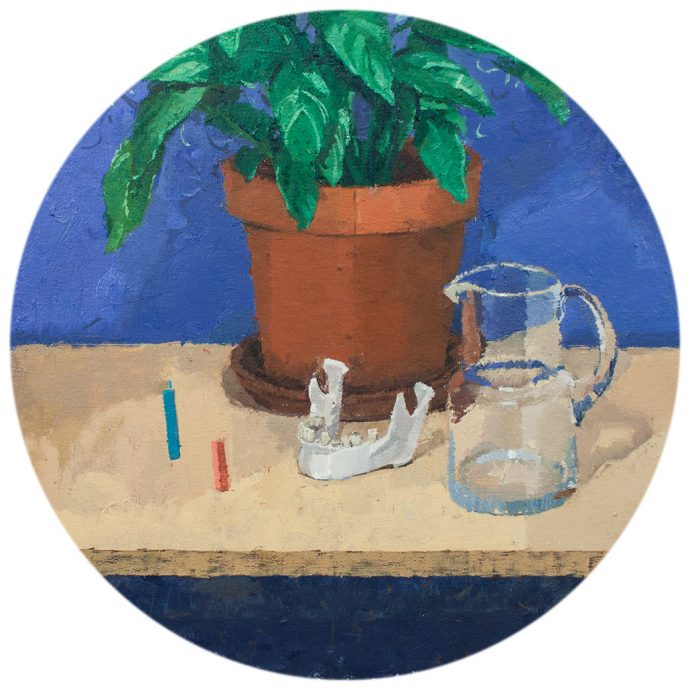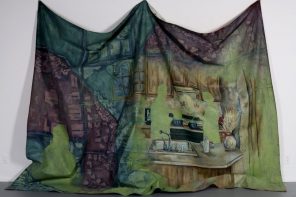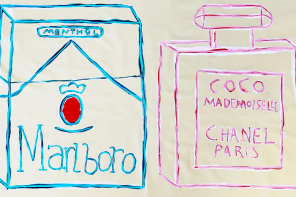Self-Portraits With Tyrannical Consistency
Fig. 2. The man says the silence makes the bus a barge. You, lacking the compassion to leap past the literal, tell him it’s because everybody else is sleeping, bone birches interrupting the cold white, sky a distracted blue. When you reach the house, he takes you down to the sauna in the basement. Yours for the moment is the kind of private life freed from most laws, you’ve yet to gain anything from this. Dry heat like the lame boy who can’t walk fast enough to follow the doomed children into the river. The man guides him back home, tells him he’s special now. You’re now the one child who may or may not matter, depending on what you can do with your hands.
Fig. 4. The city has everything you would want to gawk at, except the relics of a great saint to call its own. An angel appears before the holy man you’re named after and reveals the journey of his bones, so centuries later two merchants travel to the next continent to fulfill the lore. Cranium and clavicle, sternum and sacrum, femur and fibula, they place the remains of his saintliness at the bottom of a basket, hide them with slabs of pork. The men fly back on a winged lion, the city swooning in ecstasy as it meets them, at which point you look at the man with a raised eyebrow, Where have you taken the punchline to.
Fig. 9. The citizens slip their ballots into the mouth of a stone god, his bug-eyed warning now nothing but an accidental feature of the city, the kind tourists easily overlook. Mossy flames shoot out of his brows, and the citizens make their choice based on who has the silverest tongue. The man spends his last few days in power watching their gifts of rosewater and balsam diminish. You see him walking along a corridor, his raiment the weight of a small child, he picks at a gold thread when you make small talk. They say he has everything, but because he wants more, they paint over his likeness with the heaviest black.
Fig. 13. The painting of the lives you covet is in the Museum of Quaint and Neglected Holidays, right next to a banh mi store owned by a white guy and his tiny wife. The man hugs you, which means Till we meet again is really a polite refusal. Nature, given over to randomness, concedes and gives you night and day, spring and autumn, death and death. And the man is a face glimpsed through the window as the bus pulls away, the man is sluggish smoke from the chimney. Look up, the man’s a hazy moon. He’s the amniotic silence that takes over your evenings.
Fig. 19. Drab shore, sand the color of the inside of your elbow. The man teaches you curse words from his country, shows you a video of his hometown. Someone opens a bottle of room-temperature water, which immediately freezes as it’s exposed to the arctic air. When he says he feels smarter with you around, read a future into it. Understand that the way he brushes sand off your thigh is the answer to all the questions you need courage to ask. Back in the city now, walking to his flat for a quick fuck, he shouts at a vagrant huddled in a corner, there’s nothing like heroism to turn you on.
Fig. 20. The man’s voice takes you out to the pub, maybe the locals bark encouragements as they play pool, maybe the bartender’s singing a song about Friday night. The man explains the origins of the game, discusses its connection to horses at some point. You’re on your sixth vodka tonic, and all you can pay attention to is the slight curl of his bangs, the way his shirt sleeves ride up his arms. The cold is nothing to him. You’ve read the novel and decided to make it your life, strip it of the one thing that makes it interesting. The man is the boy, not as young but as inaccessible, and the unfortunate hero is the one who, knowing distance is the cheapest conflict, says OK anyway.
Fig. 26. Stuffed into a sack is a life you covet, slapping against the breakwater. They lay the sack on the pavement and untie its knot, the man crawling out, muttering apologies while tipping his head to the side to let water out of the right ear. When he asks to borrow your phone, you stare at him with great fear, awe scratches at the hem of your pants. Panicked rat. The man has a face that can force forward the morning, street sweepers restoring the city’s dignity. A few minutes later, a motorcycle pulls up, and the man slips the driver’s face onto his head and drives off into the dark yawn of a nameless alley.
Fig. 33. The life proves impossible, as he spends much of his in the frozen lake where he engraves bedtime stories on rocks. So you grow your own gills with a butter knife and half a bottle of whiskey. You rest your throbbing neck on the iced-over surface and from there try to read what he’s written about you. You can’t see deeply enough, of course, you’re only the blue you can’t know into. So the man comes up out of the water, records your anger with his phone, promises he won’t ever delete it. Snow falls around your body like a contrivance, the intended mood cracking the discolored ice with its heavy hands.
The World Uncontrollably Slides Into Bizarre And Grotesque Derangement
The pale and secretive face is the future carried through warm trees and unfamiliar rain. Thicket that in a novel might have seemed exotic but in a war... already self-heroic, miles from the muddy road, check the ground for snakes, smoke cigarettes.
this week, likes another the next, their invented triangles
a triumph of engineering.
Desire bids one
get past the point where to be kissed upon
parting is an impossible delight.
Boy with thorn, body a bronze abundance, hair
a Keatsian relic. Who, bending
over, opens up possibilities
like a wound. They overlook tallying the dead
of their enemy: against their four thousand, proof
you knew to grieve in private.
and their loyalty for favors nobody’s eager to grant.
One grows bored borrowing a face
from another mirror. One just happens
to be just a person but
doesn’t realize what this means, at what cost.
Softness and treachery
being what they have to make you you, your perfect mouth
its own form of violence
anaesthetizes them from their virtues. They know most of all
their envy but conceal as best they can
the savage malevolence of their longing.
these islands have been sinking since they first knew
time, one hears they’re of sand.
Because prosperity makes one an available target
they make no movement and rely
on shyness to give themselves character. One’s heard of sand.
You inspire the tendency to accept injustice
if its end is beauty, are you your illness.
There is no end yet, only
its many monuments. Out of the white crosses
six thousand ghosts in olive drab rise to state, good little boys,
safe words. Hunger drives many to incoherence.
inward and offers prayers. Rainwater collects
inside the well and to prop up each island, no more
than a boggy marsh, messy as sex, they drove wooden nails
into the water. One splits their palm
into flexion creases of half-truths.
What’s told of you: grave
eyebrows, teeth so white they’re blue, quick-loading Krag-Jorgensen,
dum-dum bullets, woman his white soul wakes to,
turning toward him, his fate yours,
you were beautiful, you were godlike
in your indifference.
only obvious snow. There isn’t a lot
of dirt so use one’s hands. Say you’re strange places
too tiring to cut across, say you believe
whatever you say about yourself—it isn’t devilish
hard work—knowing so little of it.
Ode to the Exit Sign




